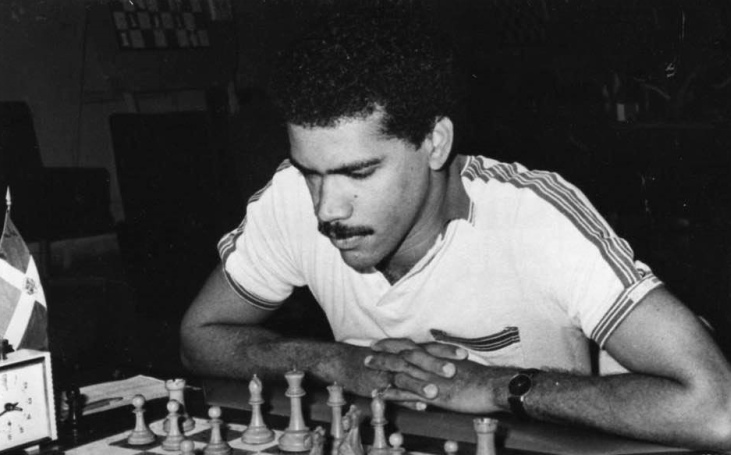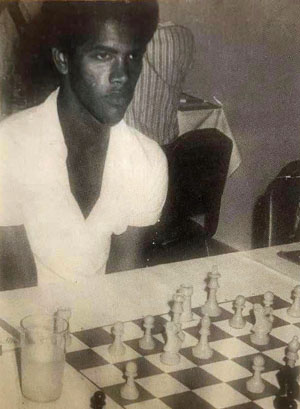Ramón Mateo… Dominican trailblazer!

Ramón Mateo



For many years, the name Ramón Mateo has been a trailblazer of Latin American and Caribbean chess. In the U.S., his name was also known due to his time living in New York and playing in the parks. However, what is clear is that Mateo (meaning “Matthew”) has not gotten the attention that one deserves. He became the country’s first Grandmaster in 2008.
A winner of many international tournaments and a Dominican legend, he continues to show his excitement for the chess building content for his YouTube channel and running his chess academy. A very charismatic figure, he is a favorite interview subject on Spanish language sites.
Over the past 20 years, The Chess Drum has covered many Latin Americans, the first being Cuba’s Rogelio Ortega, former national champion of Cuba. Incidentally, this website reported a visit to the Rogelio Memorial tournament in Havana and saw firsthand the tremendous passion of the chess players there.
Since last August, The Chess Drum has been communicating ICCF Correspondence International Master (IM), José Guillermo De La Rosa Solórzano. A native of Cuba, De La Rosa made mention of the overlooked “Afro-Cubans,” including a number of Grandmasters. The discussion has picked up steam with the passing of GM Román Hernández of Cuba who was bestowed the Grandmaster title in 1978.
De La Rosa, who is also a pastor, posted an interesting discussion on Facebook about this topic and recently conducted a short interview with Mateo. The Dominican GM speaks on his ancestry and chess exposure in the African Diaspora.

Ramón Mateo in his younger years!
Why do we not know more about players of African ancestry in Latin America? Simply put, the chess world is dominated by English content and most in these countries do not read Spanish-language websites on a regular basis, if at all. It becomes easy to miss these stories. However, with the efforts of De La Rosa, it becomes an important bridge in the chess world. One of the unfortunate realities is that many do not see the need in highlighting race, but are fine with highlighting gender and nationality. All of these demographic factors make chess very rich in experiences and accessible to a wider audience.
Mateo is a seven-time Dominican champion and has the distinction of winning national championships 31 years apart (1979 and 2010). His long service to chess is not overlooked and the chess world should support his life-long efforts. Subscribe to his YouTube channel! He is engaging and continues to show his passion!
GMI de Ajedrez Ramón Mateo

I just found out from FM Ron Young that Mateo played top board for Universidad Nacional Pedro Henríquez Ureña (UNPHU) in the Pan-Am Intercollegiate Chess Championships in 1986.
MI José Guillermo De La Rosa Solórzano is with Daaim Shabazz and
2 others
.
June 15 ·
RAMON MATEO. Gran Maestro a los 50 años. Primero en la República Dominicana. Afro-descendiente.
Ramón Mateo (nació en San Juan de la Maguana, Republica Dominicana el 23 de junio de 1958). Aprendió ajedrez de joven, y rápidamente destacó en el juego. Hace su primer viaje al extranjero en 1978, a raíz de las olimpiadas realizadas en Buenos Aires, Argentina. En 1979 ganó su primer título nacional y en 1980 tiene una actuación destacada en la 24ª Olimpiada de Malta.
Se convierte en el primer Maestro Internacional de su país en 1982. En 1987, Ramón Mateo intentó la búsqueda del título de Gran Maestro, se mudó para Belgrado, Yugoslavia, que en ese momento era uno de los centros mundiales del ajedrez.
En 1989, regresó a su país. Sin encontrar apoyo de la Federación Dominicana, decidió ir a probar suerte en New York, pero acabó alejándose de las competiciones para trabajar con comercios. En esos años solían verlo jugando por diversión en el Central Park, o aprovechando para visitar el match que disputaron Kasparov y Karpov, en 1990.
Regresó al país en 1998 otra vez con la misma meta, conseguir el título máximo al que puede aspirar un jugador de ajedrez. Gracias a su entrega, sacrificio y profesionalidad, en el 2006 y 2007 aumentó 110 puntos de Elo FIDE, para pasar la barrera de los 2500, último requisito para que la FIDE le confirmara el tan importante título de Gran Maestro Internacional.
Hasta el momento, es el primer y único dominicano en alcanzar el título de Gran Maestro Internacional, otorgado por la FIDE en el congreso de Dresde, Alemania, en el 2008.
En total Ramón Mateo ha sido Campeón Nacional en 7 ocasiones y ha jugado 10 Olimpiadas.
En la actualidad, Ramón, continúa desarrollando el ajedrez en Santo Domingo, ayudando a jóvenes promesas. Su historia de superación ayuda a muchos niños a seguir sus sueños, parece ser una “luz” en un país como República Dominicana de poca tradición en el ajedrez.
DATOS TOMADOS DE ES. CHESSBASE . COM
Ramón Mateo me responde tres preguntas.
José Guillermo de la Rosa (JG): ¿Usted se considera de raza negra o mestiza (afrodescendiente o afrolatino)?
Ramón Mateo: Sí. Me considero negro latino.
(JG): ¿Por qué no surgen muchos GM de raza negra en el mundo?
Ramón Mateo: No surgen muchos buenos jugadores de ajedrez de raza negra porque el ajedrez no se ha popularizado entre esta comunidad.
(JG): ¿Será por falta de oportunidades, menos inteligencia o talento que los blancos o chinos?
Ramón Mateo: Creo personalmente que inteligencia de sobra tenemos, y como hemos sido capaz de brillar en otros deportes, también podemos conseguir éxitos en el llamado deporte ciencia.
Gracias GM Ramón Mateo por prestigiar nuestro juego y ser un ejemplo y modelo para las nuevas generaciones.
Korneev,Oleg (2657) – Mateo,Ramon (2415) [B17]
Open Granada ESP (3), 07.12.2006
1.e4 c6 2.d4 d5 3.Nc3 dxe4 4.Nxe4 Nd7 5.Ng5 Ngf6 6.Bd3 g6 7.N1f3 Bg7 8.0–0 0–0 9.Ne5 Nxe5 10.dxe5 Nd5 11.e6 Bxe6 12.Nxe6 fxe6 13.Qg4 Qd6 14.Re1 e5 15.Bg5 Nf6 16.Bc4+ Kh8 17.Qe6 Nd5 18.Qg4 Nf6 19.Qh4 Rad8 20.c3 e4 21.Re3 Qc5 22.Rh3 h5 23.Be2 Kg8 24.Rf1 b5 25.Rg3 Qf5 26.Bc1 Nh7 27.Qxe7 Rd7 28.Qh4 Be5 29.f4 Bg7 30.Bd1 c5 31.Bc2 c4 32.Qh3 Rd3 33.Bxd3 cxd3 34.Re1 b4 35.cxb4 h4 36.Qxh4 Rc8 37.Be3 Rc2 38.Qd8+ Kf7 39.Rc1 Bf6 40.Qd6 Be7 41.Qd4 Re2 42.h3 Nf8 43.Qh8 d2 44.Rf1 Bf6 45.Qh6 Rxe3 46.Rxe3 Bd4 47.Kf2 Bxe3+ 48.Kxe3 Qb5 49.Kxd2 Qxf1 50.f5 Qd3+ 51.Ke1 e3 52.fxg6+ Kg8 53.Qh4 Qd2+ 54.Kf1 e2+ 0–1
Granda Zuniga,Julio E (2614) – Mateo,Ramon (2422) [A34]
I Bahia Feliz GM Bahia Feliz ESP (4), 15.05.2011
1.Nf3 c5 2.c4 Nc6 3.g3 Nf6 4.Bg2 d5 5.cxd5 Nxd5 6.Nc3 Nc7 7.d3 e5 8.0–0 Be7 9.Nd2 Bd7 10.Nc4 f6 11.f4 b5 12.Ne3 exf4 13.gxf4 0–0 14.Ned5 Rb8 15.Be3 Nxd5 16.Bxd5+ Kh8 17.Bf2 Nd4 18.e3 Bh3 19.Re1 b4 20.exd4 bxc3 21.Qf3 cxb2 22.Rab1 Bf5 23.dxc5 Rb5 24.Bc4 Rxc5 25.Rxb2 Rc7 26.Rb7 Bg4 27.Qg2 Bc8 28.Rxa7 Rxa7 29.Bxa7 Bd6 30.Qc6 Bg4 31.Bb6 Qb8 32.Bc5 Bxc5+ 33.Qxc5 Rc8 34.Qe3 h6 35.Kg2 Bh5 36.Kg3 Qb4 37.f5 Qb8+ 38.Qf4 Qb2 39.Kh4 Be8 40.Re7 Qb4 41.Qc7 Rxc7 0–1
Mateo,Ramon (2493) – Vazquez Igarza,Renier (2553) [D14]
I Magistral Casar de Caceres ESP (1), 22.10.2007
1.d4 Nf6 2.c4 c6 3.Nf3 d5 4.cxd5 cxd5 5.Nc3 Bf5 6.Qb3 Qb6 7.Bf4 Nc6 8.e3 e6 9.Bb5 Rc8 10.0–0 Be7 11.Ne5 0–0 12.Bxc6 bxc6 13.Qxb6 axb6 14.Na4 Bd8 15.Rfc1 b5 16.Nc5 Nh5 17.Ncd7 Nxf4 18.exf4 Re8 19.Rxc6 Ra8 20.g4 Bg6 21.Nxg6 hxg6 22.b3 Bf6 23.Nxf6+ gxf6 24.Rb6 Reb8 25.Rxb8+ Rxb8 26.a4 bxa4 27.bxa4 g5 28.fxg5 fxg5 29.a5 Ra8 30.a6 Ra7 31.Kf1 f6 32.Ke2 Kf7 33.Kd3 Ke7 34.Kc3 Kd6 35.Kb4 1–0